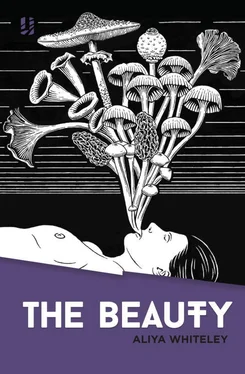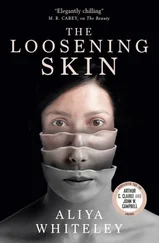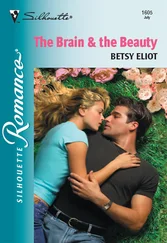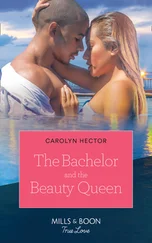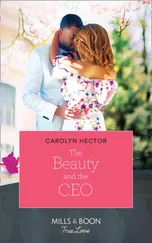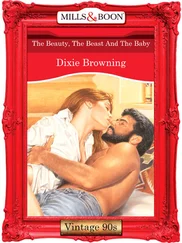Aliya Whiteley
THE BEAUTY
For H.C.M.W
who proves that change is possible
To start–
There are signs, I don’t care what William says. There are signs of change, of regeneration, and I saw the first mushrooms in the graveyard on the morning after I ripped up the photograph of my mother’s face and threw the pieces over the cliff, into the fat swallowing folds of the sea.
Timing is everything.
My name is Nathan, just twenty-three and given to the curation of stories. I listen, retain, then polish and release them over the fire at night, when the others hush and lean forward in their desire to hear of the past. They crave romance, particularly when autumn sets in and cold nights await them, and so I speak of Alice, and Bethany, and Sarah, and Val, and other dead women who all once had lustrous hair and never a bad word on their plump lips. I can remember this is not how they were; I knew them, I knew them! Only six years have passed and yet I mythologize them as if it is six thousand. I am not culpable. Language is changing, like the earth, like the sea. We live in lonely, fateful flux, outnumbered and outgrown.
Last night I spoke of Miriam. She was the teacher with a passion inside her, always burning hot, making her ferocious. When the inspectors would climb up through the rocks from the town and tell her it was their right to judge her lessons, she would fling pieces of paper at them, plans and registers, and she would sneer, a skewed expression of her natural superiority. Then, after the inspectors roared away, she would rip the papers to pieces, make celebratory confetti and tell us to dance in it.
Miriam once caught me trying to make my own records of attendance like I had seen, all our names, ticks and crosses, marks and meanings. She threatened to hold my hand over the fire if I didn’t destroy it. She said nothing good comes from anything but natural rhythms: daybreak and sunset, spring and winter. So we learned to read storms in the laying down of cows and when to plant pumpkins in the wake of runner beans. Those were our lessons, until our strengths had been discovered, and then we were given our tasks.
Miriam died early, one of the first, with the yellow fungus thick on her nose and tongue. It crawled out from her womb and down her legs.
I did not speak of death. I painted her in words of sweet sepia. She once held the hands of the little ones during lambing, cherishing the placentas, the blood of renewal. I spoke of that, and the others nodded as if they understood what she was.
Today the world moves on, and I must find new ways to turn the truth into stories. The graveyard bears more mushrooms, clustering in soft wet shapes, yellow folds and rivulets, in the outlines of the women beneath the soil. It must mean something good. William must be made to see it.
*
‘It means nothing,’ says William.
He isn’t our leader. We don’t have leaders. But he is the person who gives advice that everyone listens to. I once asked Miriam what word we could give to him that would explain that – maybe a new one, made from our minds? She threatened to chop my brain into bits and feed it to the chickens for being so cheeky. I still don’t understand why.
Such thoughts about language cannot be scooped from brains anyway. This is why I say things I shouldn’t.
‘Can I at least name them?’ I ask William.
He stares into his stew, in the earthenware bowl. It is a hearty lunch, good in the autumn days when the sun gives only a weak warmth. Thomas is always generous in his portions, perhaps because he likes the taste of his own cooking so much, unlike Diana, who always made measly meals and ate not at all.
William says, ‘Why do these mushrooms need a name?’
I say, ‘For stories?’
‘You’re going to tell a story about toadstools and fungus?’ William heaves his shoulders, like the bulging of a laugh that can’t escape his stiff belly. ‘I might skip the fireside tonight, then.’
‘They are growing from the bodies of women.’
‘That’s true, Nate, but that doesn’t make it important.’
‘Are we not important, then? We grew that way too.’
William puts down his spoon, his thoughts written in the line of his lips. ‘You are the strangest lad,’ he muses. ‘I don’t want to hear tales of growth and bodies. Talk about the beginnings of the Group tonight; I like that story the best.’
A long sigh escapes me before I can swallow it. It doesn’t go undetected by William’s ears. He gives me a look of pity, and says, ‘Tell you what, take Thomas with you and he can see if there’s eating on these mushrooms.’
‘They’re not that kind–’
‘Nate,’ he says, and the conversation is closed. I leave him to the remnants of his carrots and the tough sheep stew, and tiptoe away before he can change his mind.
*
William was once married. He lived out in the world, a city-crawler, like an insect. Marriage was a piece of paper and on it you wrote your name and the name of the woman, like paper could be a stone to the mouth of a cave and you could both be sealed within. As time moved around, a work of constant motion, William came to see that the paper meant nothing, and the city was only a swirling mess of life within which he had become lost.
So he left his wife and pointed himself south-west, ending up by the sea, in the Valley of the Rocks, where a small Group of like minds had made a place. And he found he fitted there.
When he told me about his journey, that was how he finished it – he fitted there. I find this to be the strangest of expressions – how does one fit in to other people, all edges erased, making a seamless life from the sharp corners of discontent? I don’t find anything that fits in such a way. Certainly not in nature. Nothing real is meant to tessellate like a triangle, top-bottom bottom-top. The sheep will never munch the grass in straight lines.
It’s a puzzle which my mind keeps returning to, making it difficult to focus on Thomas’s ramblings as we make our way to the graveyard. He talks of all the mushrooms he has found this autumn and the dishes he has made with them. Thomas is puffed up with his own importance as the cook, even though he is younger than me and no doubt thinks it is my duty to listen to him; but I am thinking of triangles all the way to the wooden crosses, where the shapes cancel each other out and leave me empty.
‘There’s no eating on them,’ says Thomas. He’s looking at the mushrooms: dense balls with gilled undersides, yellow with ragged browning edges, clustered on each mound of earth like flowers left for the dead. They have multiplied since yesterday. Some are as big as my fist. ‘It’s the colour. It’s a warning, isn’t it. Like red berries on green bushes. Don’t eat us, it means.’
Even though I know he’s right about the mushrooms, I say, ‘We eat raspberries, though. And strawberries.’
He rolls his eyes, but takes a few steps forward Annalisa’s grave. She was so young, just a new baby, born with the yellow disease stretched tight over her like a caul. Doctor Ben said he would have had to slice off her skin to save her. Such thoughts chase away raspberries in a flash.
Still, Thomas pulls his sleeve over his hand and picks a small one, then brings it to his nose and sniffs. He inclines his head, as if trying to decide if the wine is rancid, and a memory comes to me of another time, a night in my teenage years when I drank too much cider and giggled through the autumn festival until I nearly fell into the bonfire and my mother pulled me back to her arms and made me sit by her feet for the rest of the party.
To have someone who tells you what to do – sometimes this seems like a bad thing, and sometimes it doesn’t. Is anything forever? I’m thinking not.
Читать дальше
